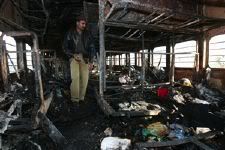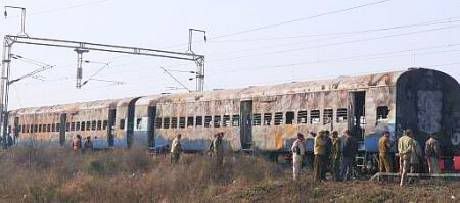Adil Najam
In a tragic development – and what is clearly the most serious threat to recent headways in the India-Pakistan peace process – a train bound from India to Pakistan (Samjhota Express) caught fire, reportedly because of two crude home-made bombs which exploded. Over 60 people are reported dead, most of them Pakistanis returning home, but the death toll also includes many Indians, including some Indian officials.


Here are some details, according to the BBC:
At least 64 people have been killed in a series of explosions and a fire on a Pakistan-bound train in the northern Indian state of Haryana, officials say. Passengers reported hearing two blasts as the train passed near Panipat, about 80km (50 miles) north of Delhi. The train – the Samjhauta Express – was part of a service taking passengers from Delhi to Lahore in Pakistan. A spokesman for Indian Prime Minister Manmohan Singh said the explosions were probably an “act of terror”. A number of other passengers were injured, and officials say the death toll may rise. The Samjhauta Express is one of two train services connecting India and Pakistan. After a two-year gap, it was reopened in 2004 as part of the peace process between the two countries.
Bloomberg adds the following information:
The blasts, which occurred after 11 p.m. last evening, were caused by crude explosives and struck two coaches of the train, India’s Railways Minister Lalu Prasad told reporters today in a televised interview in New Delhi. Pakistan condemned the blasts, saying India must conduct a thorough investigation into the act of terrorism. The train service between Indian and Pakistan is used by people who can’t afford air travel between the nuclear-armed neighbors that fought three wars since independence from British rule in 1947 and started talks to improve relations in 2003. The divided Himalayan territory of Kashmir is at the center of a dispute between the two countries that claim the region in full….
“Preliminary investigations show most of the victims are Pakistanis,” Pakistan’s foreign ministry spokeswoman Tasnim Aslam said in a phone interview from capital Islamabad today. “We expect India to conduct a thorough inquiry to find out the reasons behind this act.” The Pakistan High Commission in the Indian capital is being informed about possible casualties, zonal railways official B.N. Mathur said. A railway guard manning a signal cabin on the route between Delhi and Attari heard two explosions when the train crossed the station near Panipat, a refinery town, Mathur told reporters from the blast site….
India had the responsibility of providing security to the train in its part of the country, Aslam said, refusing to comment on the impact of the blasts on peace talks between the two countries. “We don’t know the motive behind the blasts.”

Pakistan has recently seen a spate of bombings in its major cities, and even before this some in government were pointing towards a ‘foreign hand’ in these bombings. Both countries have long played this game of ‘blame the foreign hand’, including in the recent tragic train bombings in Mumbai. The impulse to do so at the first sign of trouble is a natural one in the sub-continent. Given the deep distrust that exists between the two, it may even be understandable. But irrespective of the short-term political gains such finger-pointing might gain, it is not a very useful way to deal with deep tensions. One certainly hopes that this will not slide to that level and if, indeed, the purpose of those who did this terrible act was to hurt the peace process, then both countries will work together to make sure that this does not happen.
It is a good sign that Pakistan has announced that the visit by the Pakistan Foreign Minister to India will not be canceled. The signals from the Pakistan Foreign Ministry are sober but reasonable. According to The News:
Pakistan Foreign Minister Khurshid Kasuri Monday condemned a train blast in India which killed at least 66 people as a “horrendous act of terrorism” and said most of the victims were Pakistanis. Kasuri said he had asked the Indian government to investigate the incident overnight on a Samjhota Express. “It is a horrendous act of terrorism,” Kasuri told reporters during a function at the foreign office. “I would like the Indian government to investigate this incident. We are waiting for the results of the investigation,” he said. The minister said he had instructed the Pakistani High Commission in New Delhi to send staff to the site to help Pakistan nationals caught up in the blast.
The main leaders in India, including the Prime Minister and President, have also sent the right signals, including condolences to those who have died. The overtures from both sides are to focus on finding the terrorists who committed this atrocity. One hopes that their attentions will remain focussed on this purpose rather than succumbing to the impulse of scoring political points through the unwarranted politics of incrimination. Most of all, one hopes that neither country will allow the peace process to be derailed by this blast.



















































The participants on this forum have already started playing the blame game…We are all guilty of it. I agree with Naveed…
The question we should be asking ourselves is whether it matters who was behind the blast? Who cares whether it was a Hundu or a Muslim? Innocent lives were lost in a cold calculated manner. Whoever did this has no religion and no respect for nationality, and if anything, we should make sure we say that out loud and clear.
[quote comment=”34852″]There is more to it than just the origin of terror stories in Pakistan. Pakistan has also become a convenient whipping boy for everyone involved in the region to blame their glaring misdeeds on.
Then of course, there is a major difference between how Pakistanis and Indians conduct themselves abroad (the way they talk about their own country and the image they convey)[/quote]
Precisely. It’s way too easy to blame Pakistan…and the main reason for this damnation is our ‘strategic location.’ We’re smack in the middle of all kinds of crap. Not too long ago we were sacrificial lamb in the Cold War struggle between the U.S. and Russia.
Look around us now, we have India and China with a billion people each…the hell-hole that is now Afghanistan hugging a big part of our border and Iran to the west. If Iran gets into a military conflict, we’ll be seriously screwed from ALL sides…
The initial blame is on…wait for it…Jesh e Muhammad and Lashkar e Tayyeba;
http://www.jang.com.pk/jang/feb2007-daily/20-02-20 07/up16.gif
Apparently a Pakistani person from Karachi is “helping” police in their enquiry.
[quote comment=”34865″]Oh yes Farrukh. We know an Indian could never do it. Just like Muslims were incapable of 9/11 … right?[/quote]
You don’t read very good, YLH, do you?
Maybe if you had read what this was responding to (discussion on why Pakistan gets a bad rap in the international press) before growling you would have made less of a fool of yourself!
[quote post=”579″]Impirialism and military occupation is similarly institutionalized[/quote]
….perhaps, but that’s a discussion for another day. Also, greed, acquisition of power, corruption, racism etc which drives Imperialism and Occupation are “universal human values” in that everyone’s guilty of them at one point of another, in history or at present, in one form or another.
Destroying human life for the sake of destroying human life, blowing up innocents on a train or a building is something only supported by institutions within the muslim world. For example, if the perpetrators of this bombing turn out to be Indians, 99% of Indians will admit that it’s a matter of shame and embarassment for India that such a thing happened. If they turned out to be Pakistani, most Pakistanis will robotically say that the Kashmir issue must be solved to appease the frustrations of terrorists.